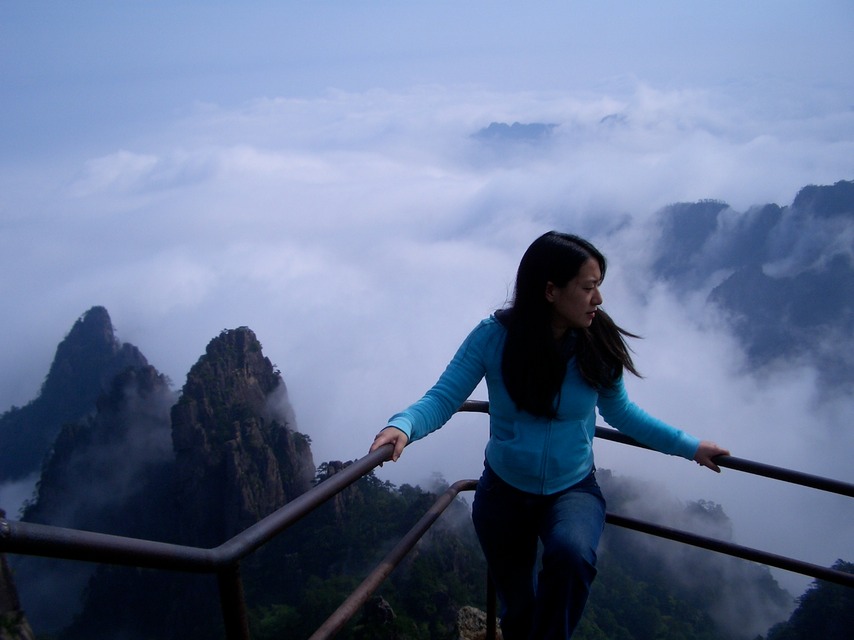
Huangshan, Anhui Province
April 2010
When I first moved to China to research and write my first novel, I never knew what to say when people asked how I was doing. The truth seemed weak and unwriterly: I was lonely and I wanted to go home.
Instead, I’d ramble about the strangeness of being Chinese American in China, the shocking intensity of Shanghai crowds even to a New Yorker, the absence of family, friends, schoolmates, colleagues. Once, I was rambling in this manner to a new acquaintance, a Shanghai native, when he shrugged and said, “You’re a linglei”—literally translated, a different species. It was a matter-of-fact statement, one that seemed, in two syllables, to sum up my existence.
Four years before, I’d moved to Beijing for a year of postgraduate study with some notions of mastering my mother tongue and reclaiming my heritage. I hadn’t expected to feel at home, but I hadn’t anticipated feeling quite so alien. Like most Asian Americans, I’d always been asked the question, “Where are you from?” with the expected answer being China, or someplace equally foreign. Now, this question was asked even more relentlessly of me by Chinese people in China, but the answer never satisfied them. But you don’t look American, they might say—or, You don’t sound Chinese. They’d assure me that I wasn’t really American, even as their suspicious expressions made clear that I certainly wasn’t really Chinese.
At the end of the year, I joined my mother, my sisters, my aunt, and my grandmother for a tour of the mainland: Six strong, complicated women, with very different ideas about what China meant to us, if it meant anything at all, herded together for two weeks on a guided package tour. We had a few moments of sudden connection and transporting wonder, but overall, the trip was frustrating and tense. When it ended, I was relieved to leave China. I thought I’d never return.
Four years later, I hadn’t stopped thinking about that tour. It seemed a perfect window into my entire China experience. I scribbled a few notes and soon I was writing a novel, one that gave equal voice to all six women on the tour, one that took those very paradoxes and frustrations as its premise and then went further than I’d ever gone in shedding light on the vast complexity of China itself, of what it means to be Chinese American, of the very concept of returning to one’s roots.
Facing my last months as an MFA student and short of options, I applied for a Fulbright Grant to research and write my novel in China. When I learned I’d received a grant, I was thrown. I didn’t want to go back to China, but my novel had taken hold over me, and I knew that immersing myself in its setting might be the only way I could write it.
All through my post-MFA summer, which I spent back home in Queens waitressing at a sports bar, partying with high school friends, and hardly writing a word, I dreaded my departure. In previous years, I’d moved without hesitation to Auckland and Iowa, but on the day of my flight back to China, I turned from the security checkpoint and implored my bewildered parents to let me stay.
This time, I landed in Shanghai without an academic program, a workplace, a residence, or an acquaintance. There were a few other Fulbrighters scattered throughout the city, but their research projects, on such topics as public health and urban planning, seemed utterly pragmatic and clear-cut compared to mine. Without a thesis, I didn’t feel like I had much to contribute to the conversation.
I moved into a studio apartment in a traditional alley where my neighbors’ vigilance in watching me seemed matched only their vigilance in not speaking to me. The locals I met seemed less interested in getting acquainted than in handing out their business cards—according to which, no one ranked below Managing Director. Amid this modern Chinese version of capitalism, with its frenzied self-invention and incessant deal-making, my pursuit seemed inexplicable. Some people demanded to know how much money I would earn off my book. Others wondered why anyone in America would care to read about my characters. A few had heard of Fulbright—and concluded that I must be a spy.
I was, at first, relieved to join the booming scene of Western expats, only to realize that, when I was among them, I was often assumed by locals to be a tour guide, a hanger-on, or a hooker. I found a circle of Chinese Americans, but they were also entrepreneurial types, incredulous that anyone would pay me simply to research and write a novel, a novel that might never get published, a novel I couldn’t satisfactorily sum up.
For as long as I’d been writing, I’d fervently believed in never explaining what I was writing about. But I no longer knew how else to introduce myself, how else to justify my presence. When people asked, I would mumble lame descriptions of my novel—which was barely seeming existent—until they mercifully changed the subject.
Once, I met a friend of a friend who wouldn’t stop asking not only what my book was about, but what overarching argument it would make about China. I politely declined to answer. He insisted that he really wanted to know, that he wasn’t just a business guy, that he had a soul, that he listened to jazz. (He was extremely drunk.) At last, I tried to articulate that novels generally don’t come to life that way. This friend of a friend declared that I was “the most pretentious person in Shanghai.”
The worst part was, my novel wasn’t coming to life. I’d learned self-discipline in grad school, to structure my life around my work, but most days, I was too busy trying to escape my isolation. I’d spend my writing hours checking email, waiting for phone calls, chatting online with family and friends in the States, feeling justified by the half-day time difference. By the time I turned back to my novel, I’d feel too sorry for myself to muster much emotion for my characters. I’d type sentences without conviction until it was time to go out and meet people again.
When that new acquaintance called me a linglei, he didn’t intend to address any of this. All he meant to assert—in the same self-assured manner that many Chinese people will state that, say, every American lives in luxury, or that Tibetans are uncivilized, or that someone is fat (to that person’s face)—was that I was a creative type. In the last few years, the term linglei has come to connote a rebel/slacker lifestyle, a tattooed and long-haired alternative to both the rampant materialism of the new China and the regimented grimness of the Mao decades, but its original meaning refers simply to those who live a life in the arts: By definition, we don’t fit in.
Writing is lonely work—not only, of course, as a Chinese American in China. To feel at home is to risk complacency, to tend toward generalization and away from what is there. Marilynne Robinson, a former teacher of mine, talks of both “alienating the familiar” and “reimagining the familiar into the exotic” simply in order to perceive reality. It’s our duty as writers to challenge ourselves on every image, on every word. It’s our duty to sit alone at our desks describing, as James Baldwin said, “things which other people are too busy to describe.” It’s our duty to discover everything for ourselves.
Of course I didn’t feel at home: That was the point. That was the premise of my novel; that was the predicament of my characters; that was the reason I’d returned. My time in China was supposed to be about those six women in my novel, not about me. And as I began to fully attend to them—immersing myself in their passions and their weaknesses, their secrets and their regrets, their hopes and their histories—they became more real than anyone around me. Not only did they take on lives of their own, completely apart from their real-life counterparts, but they gradually assumed central place in my existence.
I stopped seeking a sense of belonging. I stopped mumbling about my novel. I was too busy writing.
Touring the cities on my characters’ itinerary, I viewed the sights through their eyes, experienced the atmosphere of each setting through their moods, filtered the lore of each landmark through their personalities. Even my daily life in Shanghai became my daily inspiration, whether I was riding the bus, ordering breakfast, hanging my laundry out on bamboo poles, going to a gallery opening. Back at my desk, I wasn’t sitting alone in my studio apartment; I was, by turns, recently widowed, suddenly betrayed, turning eighty, struggling with bulimia, reliving a long-ago war, facing an unwanted pregnancy, hiking the Great Wall, having sex for the first time, and pursuing an old and doomed flame.
When my grant expired, I applied for an extension, and when that expired, I chose to stay for another two years. My new friends, the city of Shanghai, and China itself simply were what they were: my surroundings for a time. My characters had become my constant companions, and my writing had become my home.
Now, almost seven years after I landed in Shanghai, my novel has just been published. I know I’m supposed to celebrate, but the truth is that in letting go of it, I feel lost, even more lost than I felt in those first days in Shanghai. My primary consolation is that I’ve started writing a new novel. I’m still learning my way around, still learning the people who live there, but I’m all in. That, I’ve come to see, is the only way to write. Each story is where we live, unconditionally, as if for good—even knowing that, eventually, we’ll pack up and start again.

